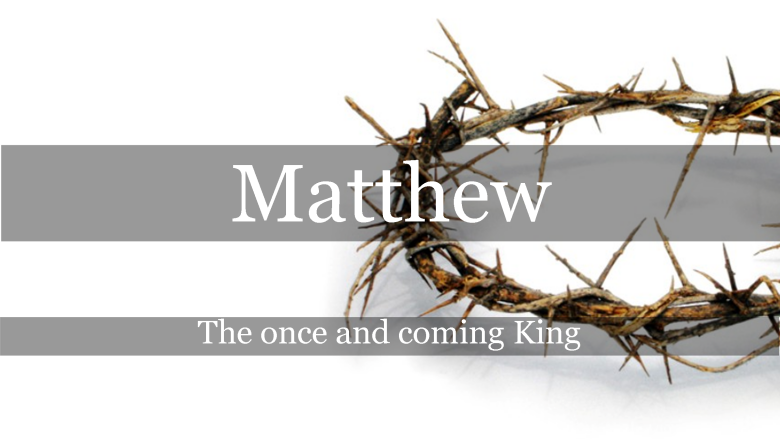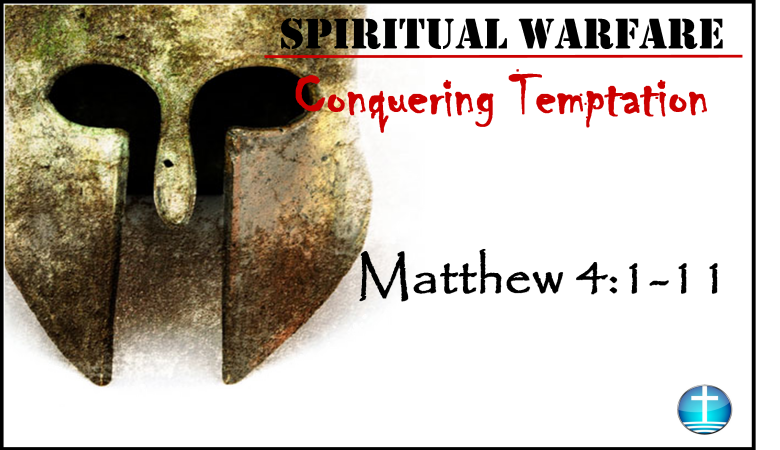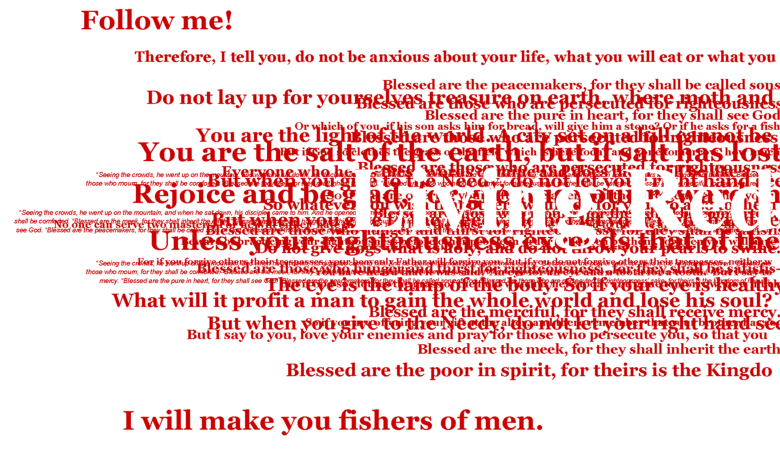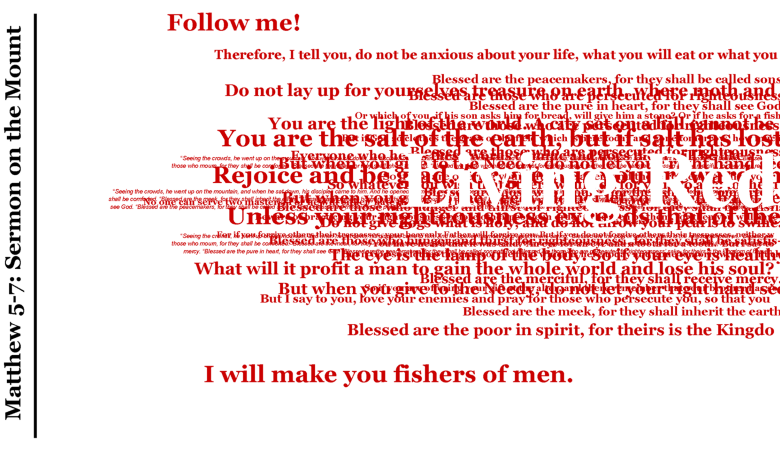Matthew 4:5-7, "Satanic Faith"
Matthew 4:5-7
Satanic Faith
Satanic Faith, Spiritual Warfare: Conquering Temptation, Part 2 of 3
By Joshua Claycamp
“Then the devil took Him to the holy city and set Him on the pinnacle of the temple and said to Him, “If you are the Son of God, throw yourself down, for it is written, “‘He will command his angels concerning you,’ and “‘On their hands they will bear you up, lest you strike your foot against a stone.’” Jesus said to him, “Again it is written, ‘You shall not put the Lord your God to the test.’”” (Matthew 4:5–7, ESV)
The Place of Faith: The Temple through the Looking Glass of Time
Our story begins in a time long, long ago at a place far, far away. There once was a man who loved God, and though he was imperfect, he was devoted to loving, worshipping, and being true to God. Now this man was childless. He longed to have a son, but he and his wife were unable to conceive. One day God gave this a man not only a son, but a promise accompanied the gift of this son. This was the promise: this son that I give you will be the father of sons, and from your son’s son will come Kings, peoples, and entire nations. This man was so overwhelmed at the kindness and compassion of God to give him not only a son but such amazing promises that he overflowed in his heart with worship for God.
But our story takes an unexpected twist: one day God came to this man and told him to sacrifice his son as an act of worship to God. In order to give something to God it is necessary that it be removed and destroyed from your hand, so that you are not able to take it back again. This is the nature of sacrifice and giving to God. God’s request meant that the man’s son would die in the traditional worship of sacrifice.
The man obeyed. He had come to a point of such complete confidence in the character and integrity of God that he didn’t hesitate, but immediately he got up and rode to a mountain far away from his home in order to sacrifice his only son, the son God had given him.
Upon arriving at this mountain, this mountain called Mount Moriah, the man dutifully placed his son upon the alter in order to perform the killing ritual. As the knife was raised high overhead, God called out: “Do not harm the boy. I know that your heart is totally devoted to me!” The man looked up, startled and relieved, and saw there was a ram caught in the thicket nearby. So the man and his son both worshipped God that day by sacrificing the ram as a substitute for the boy. (Genesis 22)
Time moved on, and that mountain top sat abandoned and empty. But it was a special place for God.
Many hundreds of years later a Great King, a famous King who also had a steadfast heart that was devoted to God and trusted in God, did something inexplicable. Although this King trusted in God, his heart wavered and his allegiances became divided. The Great King ordered that his servants go out and take a count of all his troops and soldiers so that he would know how many troops were available in the event that he needed to go to war with neighbouring countries who might oppose the King’s country. His heart turned for a brief moment from trusting in God to trusting in the number and size of his army!
God was moved to anger and He responded to the King’s betrayal by sending a horrible plague and disease upon the King’s countrymen. The King was moved to sorrow and repentance and pleaded with God only to kill him and spare his country. As the King pleaded with God he saw a terrible and frightening sight standing upon a not too distant mountain. It was the Living Word of God standing with His sword stretched out over the King’s city, that great city known as Jerusalem, ready to destroy it. The divine Messenger of God stood atop a mountain, and the name of that Mountain was Mount Moriah. The King fearfully approached the Mountain Moriah. And he saw the divine Messenger of God standing over a threshing floor belonging to a man named Ornan. It was here beneath the terrifying gaze of Jehovah that the Great King offered sacrifice in order to apologize to God, and asked God’s forgiveness for his divided allegiances. And God forgave. (1 Chronicles 21) Long after the worship service ended and the worshippers had gone home, God remembered the threshing floor of Ornan atop Mount Moriah.
Not too long after the Great King’s death, his son who was one of the wisest men ever to live, took his place upon the Great King’s throne and determined to build a place where men could come to God and worship him and ask forgiveness for their sins. The place determined by the Wise King was the place where he had witnessed his father sacrifice and ask for forgiveness. It was the threshing floor of Ornan at the top of Mount Moriah, just outside the city of Jerusalem. It was here, at this threshing floor belonging to a Gentile, a place where wheat is sifted and thrashed that it might be separated from the chaff, it was at this place that the Wise King determined to build a Temple where all might come to offer worship and ask forgiveness for their sins. (2 Chronicles 3)
Across the sands of time successive generations of God’s people flocked to the Temple to offer worship, lifting their hearts in grateful emotional praise and adoration and giving to Him the very best of the best that they had. They exalted the purity and holiness of God and simultaneously humbled themselves here at the Temple by slaughtering innocent lambs in order that God’s holiness and righteousness might be satisfied and their sins might be covered in His eyes. And God welcomed His people here to this special place where he had welcomed the old man from so many centuries before. This is the Place of Faith.
It is to this place, the Temple, the Place of Faith, that John the Baptist alludes when he calls out to the Sadducees and the Pharisees, “He who is coming after me is mightier than I am. His winnowing fork is in his hand, and he will clear his threshing floor and gather his wheat into the barn, but the chaff he will burn with unquenchable fire.” (Matthew 3)
It is to this place, the Place of Faith, that we find ourselves this morning, (1) this place that in former times served as a place where a very old man demonstrated incredible faith and devotion, (2) this place upon which a gentile thrashed and sifted his wheat separating the good from the bad, (3) this place upon which a Great King offered sacrifice as an apology for not trusting in God, (4) this place upon which a Wise King saw fit and appropriate to build a Temple to God, (5) this place where the prayers of God’s people and the offering of their worship had been heard for centuries – (6) this place to which God allowed Christ’s faith to be tested. One of the greatest Battles for Faith is about to begin, and this is the battleground upon which the contest is to be conducted: the Place of Faith
What kind of Faith will we find at the Place of Faith?
Then the Devil took Him to the Holy City and set Him on the pinnacle of the Temple...
We met the Emperor of Darkness, the Dark Beast and the Accuser, last week, but before we begin the second great battle of holiness and purity today, we must first meet our champion, the Saviour Messiah.
Jesus, the Messiah: Messiah is a Hebrew word that literally means “God’s anointed.” Messiah is not a new concept. It’s much older than most of us would imagine. It’s not an idea that even began 2,000 years ago. It’s much older than that. The hope of the Messiah lies at the heart of the Old Testament. From the third chapter of Genesis (Gen. 3:15) to the third chapter of Malachi (Mal. 3:1), the Hebrew Scriptures repeatedly proclaim that the Savior is coming. As the generations of Israel became familiar with these passages, they took God’s promises to heart. Though they waited eagerly, year after year, for their coming Savior, their sense of expectation only increased as the centuries passed. Thus, by the time of Jesus’ public ministry, anticipation regarding the Messiah had reached a fevered pitch.
Now we have the conjunction of two important things: The Place of Faith meets the Faithful One. What kind of faith will we find at the Place of Faith?
Satan’s Exhortation to Trust
“Since you are the Son of God throw yourself down, because it is written...”
Therefore, Jesus, being the Christ, will live His life in obedience to the Scriptures. Satan acknowledges this truth and then makes a logical suggestion: Throw Yourself down. Why would Jesus do this? Well, they are high on top of a Temple where God has heard the prayers of His people for centuries. They are at the center of God’s loving care for His people, at the place where God’s protection is placed over His people, where it is said that His covers them. Satan even uses Jesus’ own expression, “It is written…” and provides Biblical justification for why it is okay for Christ to jump.
The verses that Satan quotes are from Psalm 91:11-12:
“‘He will command his angels concerning you,’
and
“‘On their hands they will bear you up,
lest you strike your foot against a stone.’”
The passage quoted is addressed to all who have chosen to live in the shelter of the Most High, and this most obviously includes Jesus. Of all those who have hidden in the shelter of God’s loving care, none has done this better or more consistently then Jesus.
Satan is saying to Jesus, “Trust God!”
If Jesus does not jump, then perhaps He doesn’t really have faith in God. If Jesus does not jump then perhaps He is putting his confidence, his hope somewhere else. Perhaps Jesus is relying upon something, anything, other than God. Unlike Abraham who was willing to lift the knife against his own son, unlike the Great King who prayed that God kill him and spare His nation, unlike the countless others who pilgrimaged to Jerusalem every year and slaughtered innumerable lambs down through the centuries without completely understanding the significance of what they were doing. Unlike those who went before him, perhaps Jesus does not have faith enough to trust in God.
Christ’s Confidence in the Totality of Scripture: Total Truth
“Again, it stands written, ‘You shall not put the Lord your God to the test.’”
Jesus quotes Scripture not because he doubts the validity of God’s promise, but because he disputes the validity of God’s promise in Psalm 91:11-12 as a proposal for committing certain suicide.
Jesus quotes again from Deuteronomy, but this time from 6:16.
“You shall not put the Lord your God to the test, as you tested him at Massah.” (Deuteronomy 6:16, ESV)
Jesus quotes from a sermon that Moses gave to the people of Israel right before they were about to enter into the Promised Land. As they were preparing to enter the land, Moses begins to give them some instructions about how they are to remain devoted to God. In his sermon, Moses references back to an account that happened very soon after God parted the depths of the Red Sea and enabled the people to walk across on dry ground. Out of water, the people griped and grew angry. Thirsting for water, they attempted to force God’s hand. In a manipulative fashion, they began to ask each other: “Is God really with us or not?” Then they turned on Moses, whom they knew to be God’s representative. They argued against Moses suggesting that it was obvious that God wasn’t really there to provide for them because they had no water. It was secretly thought and wickedly hoped by the people that by griping to each other in this way and arguing against Moses God would overhear them, feel indignant that His people would wonder about His faithfulness to them, and would be driven by a desire to prove Himself once again to them, although He had just parted the Red Sea and fed them in the wilderness with Manna.
Apparently, their test was a form of challenge, a challenge they knew God was capable of meeting, yet one that they preferred to trick Him into meeting rather than humbly and prayerfully requesting water. They attempted to manipulate God into rising to the occasion and proving Himself to them, and through this trickery they could then satisfy themselves with fresh water. Moses reflects upon this experience years later as the people are about to enter the promised land and says simply, “Don’t ever do this again.”
We see Christ’s handling of Scripture. His “Again, it is written...” shows that He would not accept any interpretation of Scripture that might generate an idea He knew to be contrary to some other part of Scripture.
Satanic Faith
Did you know that faith can actually be seriously harmful? Some varieties of faith actually lead away from the True God—substituting superstition, falsehood, or even faith itself in place of the Truth. Such faith inevitably leads to spiritual disaster. It is Satanic faith.
We see now the nature of Satanic Faith, the Faith to which Satan encourages Jesus Christ to believe. The Devil’s suggestion is to rely upon and trust in the literal truth of God’s promises of protection in opposition to other clear Revelation from God. If Satan cannot get you to refuse God, he will tempt you to pick and choose what parts of Scripture you will listen to.
Satanic Faith goes to two extremes. At one end of the spectrum it looks within—relying on feelings, inner voices, fantasy, or subjective sensations. At one end of the extreme Satanic Faith encourages you to believe in anything other than God and to wilfully reject the Word of God. At the other extreme Satanic Faith fixes its hope on some external human authority—the teachings of a supreme leader, religious tradition, magisterial dogma, or some other arbitrary canon. These objects of faith may refer to Scripture but they do so in a way that twists Scripture and does not include the totality of all that God has spoken. These faith traditions, so-called, hold one verse in opposition to another. They attempt to kidnap the meaning of Scripture.
An obvious example of the first extreme, looking inside of oneself for truth, is New-Age mysticism. An obvious example of the second, appealing to some supreme leader or religious tradition, is Islam. In New Age Mysticism there is never any thought given to objective truth. It is all subjective: whatever makes you happy is true. In Islam there is a lot in common with the Bible. They even have portions of Scripture within the Qumran that sound almost exactly the same as certain portions of Scripture found within Genesis and the early books of the Bible. But the twisted truth of Islam is that it rejects the vast majority of Scripture and substitutes its own false ideas in its place.
Love: Most sinister of all to Satanic Faith is this: people actually think they are worshipping God, loving God, serving God, when they abandon and walk away from so much of what God says. You can’t honestly think that you are loving God when you refuse to get to know Him for who He is.
Believing God with Faith in the Truth
Note that at both poles Satanic Faith seeks spiritual truth apart from a harmonious and consistent understanding of the totality of Scripture—and that is the very point at which it becomes Satanic. Both kinds of Satanic Faith also have this in common: they are illogical and anti-intellectual. “Anti-intellectual” means they spurn the intellect, the mind, and encourage blind, uncritical trust. Anti-intellectuals often set faith against reason in a false dichotomy, as if the two were opposites. That kind of “faith” is gullibility. It is foolishness, and not biblical faith. Biblical faith is never illogical.
In defending logic and reason, I am not suggesting that human reason even at its best can lead a person to saving truth. We suffer so much from the Noetic Effects of sin upon our mind that none of us could ever intellectually reason our way to salvation. That is why God has given us supernatural revelation in His inspired Word, the Bible. Scripture is God’s revelation to us. It is true because God is true (Romans 3:4). We don’t reason our way to this truth. Rather, we begin by hearing the proclamation of Truth from God’s sent messengers (Romans 10:15), taking God at His Word (Hebrews 4:12; Hebrews 11:6), and we make Scripture the foundation on which all intellectual reason builds (Romans 12:1-2).
Authentic faith can never bypass the mind. It cannot be irrational. It cannot be illogical. Faith, after all, deals with truth. Truth is objective data to be known, studied, contemplated, and understood. All those are activities that engage the intellect.
That means genuine Christianity cannot be anti-intellectual, and it cannot hold contradictory ideas together. The body of truth on which our faith is based has depths that are mysterious—unfathomable to the merely human mind, or inscrutable—but truth is never contradictory. The difference is all-important. God cannot lie (Titus 1:2). Therefore what God says is true—and the antithesis of truth must also be false. Truth cannot be self-contradictory. Truth makes sense; nonsense cannot be true.
Application
- Individualism – those who would reject the Bible altogether in favour of their own understandings. We must be careful not to bring to the text our own ideas, but to let the Bible speak for itself.
- Sensationalism: Those who pursue the sensational, thinking they are pursuing God, are mistaken. To require in even the slightest capacity sensational and miraculous proofs of God’s care beyond the Crucifixion and Resurrection of Jesus Christ is to hold a superficial, infatuation with God. It is not true loving faith. It is closer to self-gratifying lust. You do not love God for who He is. You pursue him out of a love for yourself, specifically a self-love that wants to be entertained, a self-love that wants to have your needs met, and a self-love that wants to see the supernatural satisfaction of those needs.
- Extreme Pentecostal Movement – individuals who insist that they must see the supernatural or else it isn’t of God!
- Basic Obedience – Average Joe who knows the right thing to do, but prays and asks God for special signs to tell him what to do before he will obey.
- Surgical Extractionism or Proof Texting: Those who surgically extract certain texts of Scripture in isolation from the totality of the Bible in order to support a particular notion or practice engage in what I call ‘surgical extractionism.’ These people even believe that by doing this they are promoting unity. They are engaged in the same butchery we would expect to find with a high school drop-out performing advanced neurosurgery, conducting craniotomies and other forms of brain surgery. These individuals extract a fragment of gray matter and then run around claiming to have a fully functioning brain.
- Theological Triage – The belief that no beliefs are absolutely important, that we have the power to discern which beliefs are absolutely important, and that since we have the power to know what’s important and what’s not important, we have the authority to abandon those beliefs. Listen to me- you are engaged in the same kind of butchery that Satan engages in.
- Multiple Denominations – It is this theological triage that has resulted in so many thousands of denominations; it is these groups of people that hold one belief as essential to the exclusion of all other beliefs.
- Divided Christians -
There Can Be No Retreat from the Truth.
Someone has said, “Truth is undeniable.” We cannot deny the Truth. But we must take this a step further. To master one portion of the Bible without attempting to learn and submit to all of it, is really to appreciate none of it. To knowingly turn your back on portions of the Scripture, to knowingly disregard the totality of the Bible, and to content yourself with understanding only a little bit of it is tantamount to retreating from the Truth. And there can be no retreating from the Truth!
Oliver Buswell's years as president of Wheaton College and later as professor of theology at Covenant College and Seminary were well known, but we hadn't heard a lot about his experience in World War I. Serving in France as chaplain of the 140th Infantry for the American Expeditionary Forces, he took part in the Meuse-Argonne offensive, the war's largest western front offensive against the German army. That offensive began on September 26, 1918.
Sep. 24, 1918
Dear Father and Mother:
I'm writing just before what will probably be the greatest military activity the world has ever seen. There are lots of interesting things might be told, but I'll tell you all about it when I get back home! One thing that would be very significant in religious work, and it is an order that's scattered everywhere so every private and orderly knows it, is that anyone who at any time orders any kind of retreat or retirement, is to be shot down at once by an officer. If no officer hears it, the enlisted men must take the offender to the nearest officer to be shot.
We're going forward, and no orders to retreat can possibly be official. Germany has repeatedly sent men into the Allied ranks perfectly disguised as Allied officers, speaking English or French perfectly, to order a retreat, just as the Devil sends the same kind of people into the church looking like perfect Christians. The only way to overcome it is to have it understood that our forces never retreat!
This is going to be a great fight! But the fight for Christianity in our forces is the one which includes all other great causes. You don't know how glad I am that I'm in that fight primarily.
Don't worry about me even if you hear our regiment has been 'in it.' I'm in the Lord's hands.
Much, much love,
Oliver
Bridge Baptist Church, when we come to the Place of Faith we see the type of faith that the Faithful One exhibited. He was not extracting certain portions of the Scripture and then deceiving himself into thinking that he was loving God for all that God is. He learned all of the book. We must learn all of the Book. Learn all of it. Master as much of it as you can. Love your God for all that He is! To knowingly turn your back on any one truth, to leave any treasure uncovered, to leave any stone unturned is to engage in a Satanic Faith. To walk away from any part of God’s truth is to surrender to the enemy, and it is your enemy that encourages this Retreat. But for true Christians, for us here at Bridge Baptist Church there can be no retreat.
Series Information

The Gospel of Matthew is a story about a once and coming King. Jesus of Nazareth is the Son of David, the long awaited for Messiah. He has come once, and Matthew tells the story of His arrival, ministry, sacrificial atoning work on the cross, and His promise to return soon.






